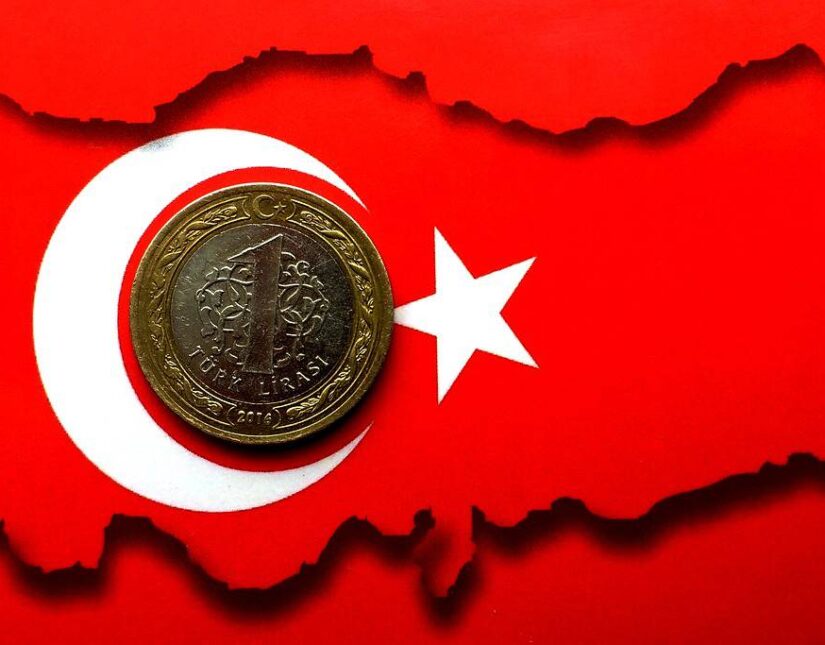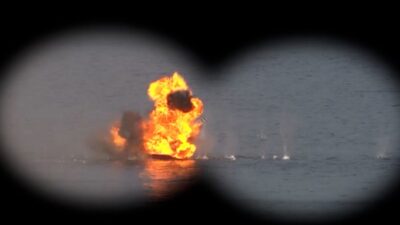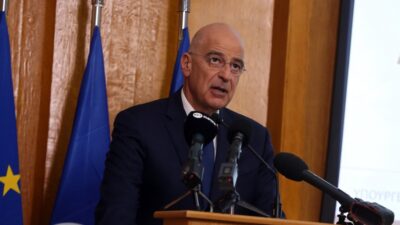Kostas Melas: Why the collapsing Turkish economy is not collapsing
09/10/2020
Opinions are increasingly emerging in the public debate that confirm with certainty the impending “collapse” of the Turkish economy. The main argument is based on the significant devaluation of the Turkish currency against the currencies of Turkey’s main trading partners and especially the US dollar and the euro, which has been observed especially after 2018. It is worth noting that the new Turkish currency was introduced on January 1, 2005 with a value vis-a-vis the USD of 1: 1,325.7. The Turkish currency has been slipping steadily against the dollar throughout Erdogan’s rule.
The main reason can be sought in the continuous deficit of the Turkish current account, the refinancing of which, however, with a constant inflow of resources from abroad, made the currency slip relatively controlled. It is a given that this monetary slide was organically integrated into the formulation and exercise of Turkey’s economic policy with all the negative and positive effects that this entails.
Developments, as the currency continues to slide, are common in countries with current account deficits in their quest to offset part of the loss of competitiveness of their economies. Let us not forget that the Greek drachma was constantly slipping in the period 1974-2000. Specifically, the exchange rate against the dollar was 30 drachmas in 1974, while in 2000 when it entered the euro it was 365.6 drachmas.
Things are changing in Turkey after the coup in July 2016. Over the last three years, inflows of resources from abroad have decreased dramatically, resulting in an increasingly narrowing of foreign exchange to refinance existing liabilities (long-term and short-term) of the current account deficit. The two main causes of this situation are the geopolitical games and the economic policy pursued by President Erdogan.
The first concern
A number of developments in Turkish politics have caused concern and uncertainty to investors, as a result of which they are withdrawing their funds from the country. These developments are:
- Erdogan’s departure from the “political principles” of the West,
- The abandonment of any thought of joining the EU with the parallel emergence by part of the political establishment of the country’s Asian perspective,
- The threats that Erdogan utters to anyone who disagrees with him, the strategic approach with Russia and Iran and most recently with China,
- Involvement in wars over the conquest of territories (Syria) or colonization of countries (Libya) in line with classic European imperialism before World War II, and more generally his involvement in the full range of problems concerning the Arab world
At the same time, the current economic policy seems to be the opposite of what should be pursued in the specific globalized environment in which the Turkish economy still operates. The exercise of this type of economic policy also contributed more to the withdrawal of foreign capital from the country.
Erdogan simply believes that the only way to overcome the difficulties is to increase GDP continuously, even if it causes temporary difficulties in the exchange rate of the currency and beyond.
It seems that the growth of the domestic (real) sector has always been the first concern and the factor that ensured, in the long run, the solution to the problems that arise in the monetary sector of the economy. GDP growth is theoretically a criterion for capital inflows, given that in a high and growing income economy it constitutes a positive incentive for direct and other types of investment from abroad. In other words, he considers that closing his eyes to the existing problems (accumulation of external debt, devaluation of the currency, weakness or difficulty of refinancing the debt) will be covered by the growth of GDP. In this way, the flourishing period of the first decade of the rule of the Party of Democracy and Development will return.
On the razor’s edge
This choice puts the Turkish economy on the razor’s edge, in the sense that the foreign exchange liquidity crisis risks turning into a solvency crisis, which means a complete cut-off from the financial markets. To date, this has not happened. Also due to the oligarchic nature of the regime, the government can intervene in an authoritarian administrative way in the economy in order to obtain the necessary resources to refinance its obligations.
These measures, as is well known, are the following: loans from friendly countries, currency swaps also with friendly countries, foreign currency loans of the Central Bank from private Turkish banks, purchase of all the country’s gold production, mortgage of future assets ( mainly infrastructure) of the Turkish state, but also assets of state and private companies in foreign countries (Qatar, China, etc.). Indirect and direct sale of Turkish state assets is almost certainly not a long-term solution.
Of course, this policy has its limits. But in time we can not say when it will reach these limits and if it will reach these limits as future developments are open and unpredictable and especially with Erdogan as president.
Why Erdogan ignores rating agencies
Why, then, does Erdogan insist on ignoring rating agencies, despite repeated remarks and warnings from the agencies and international analysts that economic policy is the opposite of what should be pursued according to the textbooks of economic theory?
The crucial point that may be a kind of answer to the indirect question of the above paragraph could be the following: the economic policy mix pursued by the Turkish government is in line with Erdogan’s general geostrategic effort to make Turkey a regional power. Just as he strives for autonomy on the geopolitical chessboard in order to make Turkey an equal interlocutor with the great powers, so also does he deal with economic policy. That is, he aims to break free from the constraints imposed by the international environment in which the great western economies are known to dominate.
But a “liberal”, by Western standards, Turkey could easily change economic policy, as all Western multilateral institutions of globalization show. But that would mean, according to Erdogan and his dominant group, that Turkey would snatch from the gap between Skyla and Charybdis the economic ties imposed by Western imperialist powers. He has repeatedly stated this: a country can not be a regional power without degrees of freedom and the possibility of pursuing an autonomous economic policy.
From 2002 to 2015-6, Erdogan took full advantage of all the circumstances presented to him, in the context of globalized capitalism, and with the full help of Western companies, he managed to increase the country’s GDP by almost 4 times (from 220 to $ 850 billion) with all that entails for the general well-being of the Turkish people. That is, the per capita GDP in terms of purchasing power in 2019 was 28,167 from 15,469 in 2002. Let me say in passing that the corresponding Greek per capita GDP in 2019 was 30,314 from 31,502 in 2002!
Turkish economy and hard power
At the same time, however, Turkey diligently pursued the transformation of its economic growth into hard-core material agents. This is shown by two elements:
- The first is the development of Turkish defense technology and industry over the last 20 years or so, which ultimately seems to have borne fruit. Although this sector has not developed to the extent presented by the Turkish establishment, it is still at such a level as to strengthen the firepower of the army and cause multiplier effects in the economy. Moreover, the continuous increase in defense spending, and especially in the period after the coup attempt in 2016, filled the order books of Turkish companies, activating the Turkish economy.
- The second is the continuous increase in defense spending, especially in the period after the coup attempt in 2016, as shown by the available data: from 13.0 billion in 2010 to 22.0 billion US dollars.
We should not assume that Turkey has gained autonomy in the production of weapons systems, given that much of the technology used is imported (value-added probably does not exceed 40.0%) and also the required raw materials, and semi-finished goods, are imported, as also a series of products necessary to create the end result.
The same is true of its economic dependence on the West, China, and Russia. Turkey exports 59.0% of its goods to European countries, 25.0% to Asian countries, 7.8% to African countries, and 7.6% to American countries. Respectively, it imports 53.0% of the total from European countries, 33.0% from Asian countries and 11.0% from American countries.
With Europe, the balance of goods in 2019 is in surplus, in contrast to China and Russia which is purely in deficit (about $ 19 billion with both countries in 2018). But we must not forget that a large part of the industrial goods exported to Europe is essentially due to the European companies located in the country. Also a large part of the so-called strategic goods (technology and raw materials) are imported from the West and most recently from China. The geo-economic shift (?) that Turkey is making with China and Russia is essentially increasing its economic dependence on these two countries.
Stepping on air
The sharp rise in hard power that Erdogan is trying to use, like the old imperialist powers, to reap the benefits (diplomatic, geopolitical and economic) in a desperate attempt to overcome his current difficulties of all kinds, is in danger of proving at the same time to aggravate the current financial difficulties. The more Turkey tries to increase the production capacity of its heavy and related defense industry, preparing for its expansionary policy, the more it will depend on the world market and the import of raw materials and technology.
This is a step in mid-air with chances of falling into the void being very high, as its power (political and economic) still, despite progress, lags far behind the western developed countries. However, I think that all of the above explains how Erdogan has been governing the economy lately.
All analyses based on the autonomy of the Economy from Politics – something that is actually impossible, but which is an old liberal approach that unfortunately still prevails in economic thought today – focused on stock market indices, can not interpret Erdogan’s economic policy, except if they think that Erdogan does not know what he is doing and is blindly moving along.
The political expression of economic and industrial interests, intertwined with other, non-economic actors, reflects the enormous dynamics of globalized capitalism, which goes beyond the simplistic reduction of those trying to separate political from economic factors.





